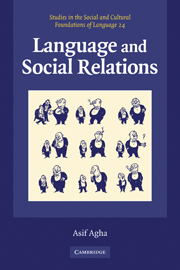Book contents
- Frontmatter
- Contents
- List of figures
- List of tables
- Acknowledgments
- Typographical conventions
- Introduction
- 1 Reflexivity
- 2 From referring to registers
- 3 Register formations
- 4 The social life of cultural value
- 5 Regrouping identity
- 6 Registers of person deixis
- 7 Honorific registers
- 8 Norm and trope in kinship behavior
- Notes
- References
- Index
- STUDIES IN THE SOCIAL AND CULTURAL FOUNDATIONS OF LANGUAGE
1 - Reflexivity
Published online by Cambridge University Press: 05 September 2012
- Frontmatter
- Contents
- List of figures
- List of tables
- Acknowledgments
- Typographical conventions
- Introduction
- 1 Reflexivity
- 2 From referring to registers
- 3 Register formations
- 4 The social life of cultural value
- 5 Regrouping identity
- 6 Registers of person deixis
- 7 Honorific registers
- 8 Norm and trope in kinship behavior
- Notes
- References
- Index
- STUDIES IN THE SOCIAL AND CULTURAL FOUNDATIONS OF LANGUAGE
Summary
Introduction
In every human society certain uses of language make palpable highly specific kinds of social effects such as the indication of one's relationship to persons spoken to or spoken about, or the presentation of self as belonging to some identifiable social group, class, occupation or other category of personhood. In such cases particular features of utterance appear to formulate a sketch of the social occasion constituted by the act of speaking. Our sense that the people that we meet are persons of certain kinds, that they differ from us in status or group-affiliation, that they establish recognizable roles and relationships in their encounters with us are all social effects mediated by the utterances they produce. Unavoidably, such effects depend also on accompanying non-linguistic signs (such as gesture, clothing, features of setting) which comprise a context for construing the effects of speech. In general, therefore, the social effects mediated by speech are highly context-bound or indexical in character: they are evaluated in relation to the context or situation at hand, including those aspects of the situation created by what has already been said or done. Either an utterance is felt to be appropriate to the situation as already understood, or it alters the context in some recognizable way, transforming it into a situation of an entirely different kind. We may speak, in particular, of social indexicality when the contextual features indexed by speech and accompanying signs are understood as attributes of, or relationships between, social persons.
- Type
- Chapter
- Information
- Language and Social Relations , pp. 14 - 83Publisher: Cambridge University PressPrint publication year: 2006



